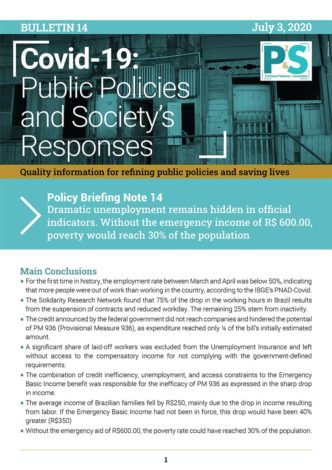Main Conclusions:
- For the first time in history, the employment rate between March and April was below 50%, indicating that more people were out of work than working in the country, according to the IBGE’s PNAD-Covid.
- The Solidarity Research Network found that 75% of the drop in the working hours in Brazil results from the suspension of contracts and reduced workday. The remaining 25% stem from inactivity.
- The credit announced by the federal government did not reach companies and hindered the potential of PM 936 (Provisional Measure 936), as expenditure reached only ¼ of the bill’s initially estimated amount.
- A significant share of laid-off workers was excluded from the Unemployment Insurance and left without access to the compensatory income for not complying with the government-defined requirements.
- The combination of credit inefficiency, unemployment, and access constraints to the Emergency Basic Income benefit was responsible for the inefficacy of PM 936 as expressed in the sharp drop in income.
- The average income of Brazilian families fell by R$250, mainly due to the drop in income resulting from labor. If the Emergency Basic Income had not been in force, this drop would have been 40% greater (R$350)
- Without the emergency aid of R$600.00, the poverty rate could have reached 30% of the population.
Work group responsible
Coordination:
Ian Prates (CEBRAP) e Rogério Jerônimo Barbosa (CEM)
Researchers:
- Thiago Meireles (USP)
- Vitor Menezes (USP)
- Sergio Simoni (UFRGS)
- Paulo Flores (USP/CEM)
- Eduardo Lazzari (USP/CEM)
- Hellen Guicheney (CEM)
- Carolina Requena(CEM)
- Heloisa Fimiani (USP)
- João Lucas Oliveira (USP)


